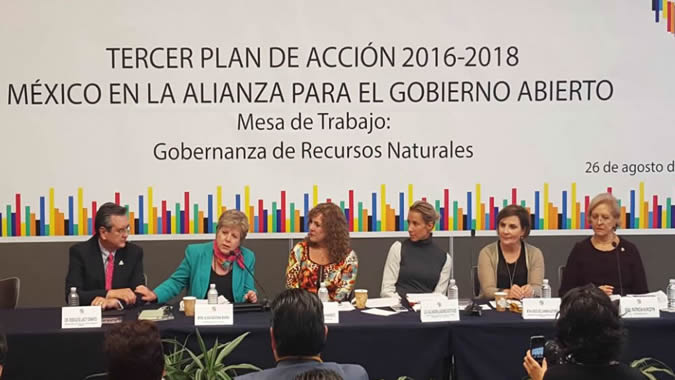Briefing note
“The participation by civil society and the access to accurate, real and timely information is fundamental to building better governance of natural resources,” said Alicia Bárcena, Executive Secretary of the Economic Commission for Latin America and the Caribbean (ECLAC) today in Mexico during a presentation in that country’s Congress headquarters.
The United Nations senior official was one of the main speakers at the roundtable discussion on governance of natural resources and climate change held in the framework of the Open Government Partnership meeting in Mexico. The gathering is part of the construction of the third action plan for 2016-2018 under this initiative.
Bárcena reminded that the dominant style of development is not sustainable. The recessionary bias being experienced in the world today, with low economic growth and falling trade, is compounded by great inequality, the technological revolution and climate change. For this reason, a progressive structural change is needed to meet the goals set forth in the 2030 Agenda for Sustainable Development.
“We must go from a culture of privilege to a culture of equality,” stated Bárcena, in reference to the protection and harnessing of the natural resources that the region possesses.
ELAC’s Executive Secretary said that Latin America and the Caribbean have one-third of the planet’s freshwater reserves and 12% of its arable surface. Moreover, a third of world production of bio-ethanol, close to 25% of biofuels and 13% of oil are found in the region, which also contains 65% of lithium reserves, 49% of silver, 44% of copper, 33% of tin and 32% of molybdenum, in addition to significant reserves of bauxite, nickel, iron and zinc.
“A pact on the governance of natural resources is needed between the State, civil society and the private sector, in which we discuss the ownership, raising, distribution and investment of earnings so that they might contribute to improving the lives of citizens,” indicated Bárcena. “This is not only a technical effort, it is a political challenge,” she insisted.
ECLAC’s Executive Secretary said that the Open Government Partnership must focus on equality as its guiding theme, understood as the entitlement to rights and access to public assets such as health and geographic mobility, among others.
“Count on ECLAC to accompany this process, especially in Mexico, to ensure the rights of civil society, its access to information, and thus to the full exercise of citizenship,” she said.
Finally, Bárcena reminded the importance of defending the autonomy and legitimacy of the institutions in charge of compiling information, such as Mexico’s National Institute of Statistics and Geography (INEGI according to its initials in Spanish), and moving forward on initiatives such as big data in order for such knowledge to truly get to the people and enable them to exercise their rights.
Also participating in the round table were Rodolfo Lacy, Undersecretary of Planning and Environmental Policy of the Mexican Ministry of Environment and Natural Resources; Senator Luz María Beristain, Member of the Mexican Senate Special Committee on Climate Change; Senator Manuel Cárdenas, Secretary of the Mexican Senate Special Commission on Climate Change; María Kurczyn Villalobos, Commissioner of the National Institute on Transparency, Access to Information and Personal Data Protection; and Rocío del Carmen Alatorre, Commissioner of the Federal Commission for the Sanitary Risk Protection.



